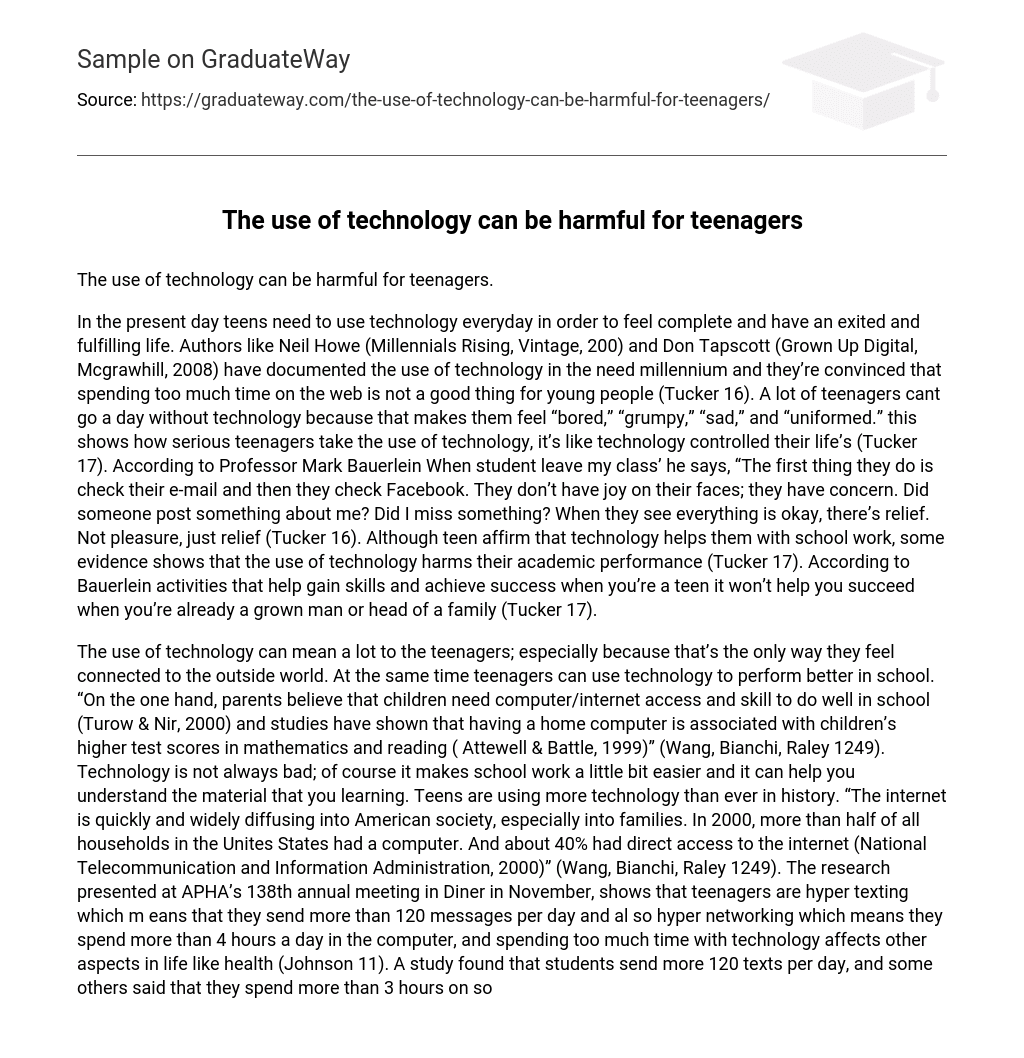In the present day teens need to use technology everyday in order to feel complete and have an exited and fulfilling life. Authors like Neil Howe (Millennials Rising, Vintage, 200) and Don Tapscott (Grown Up Digital, Mcgrawhill, 2008) have documented the use of technology in the need millennium and they’re convinced that spending too much time on the web is not a good thing for young people (Tucker 16). A lot of teenagers cant go a day without technology because that makes them feel “bored,” “grumpy,” “sad,” and “uniformed.” this shows how serious teenagers take the use of technology, it’s like technology controlled their life’s (Tucker 17).
According to Professor Mark Bauerlein When student leave my class’ he says, “The first thing they do is check their e-mail and then they check Facebook. They don’t have joy on their faces; they have concern. Did someone post something about me? Did I miss something? When they see everything is okay, there’s relief. Not pleasure, just relief (Tucker 16). Although teen affirm that technology helps them with school work, some evidence shows that the use of technology harms their academic performance (Tucker 17). According to Bauerlein activities that help gain skills and achieve success when you’re a teen it won’t help you succeed when you’re already a grown man or head of a family (Tucker 17).
The use of technology can mean a lot to the teenagers; especially because that’s the only way they feel connected to the outside world. At the same time teenagers can use technology to perform better in school. “On the one hand, parents believe that children need computer/internet access and skill to do well in school (Turow & Nir, 2000) and studies have shown that having a home computer is associated with children’s higher test scores in mathematics and reading ( Attewell & Battle, 1999)” (Wang, Bianchi, Raley 1249). Technology is not always bad; of course it makes school work a little bit easier and it can help you understand the material that you learning. Teens are using more technology than ever in history. “The internet is quickly and widely diffusing into American society, especially into families.
In 2000, more than half of all households in the Unites States had a computer. And about 40% had direct access to the internet (National Telecommunication and Information Administration, 2000)” (Wang, Bianchi, Raley 1249). The research presented at APHA’s 138th annual meeting in Diner in November, shows that teenagers are hyper texting which m eans that they send more than 120 messages per day and al so hyper networking which means they spend more than 4 hours a day in the computer, and spending too much time with technology affects other aspects in life like health (Johnson 11). A study found that students send more 120 texts per day, and some others said that they spend more than 3 hours on social networks during every school day (Johnson 11).
A lot more people get involved with technology as the time goes by, and at the same time not only tens but everybody is getting more addicted to it. Every person needs their sleep in order to fully recuperate the energy that they need to continue with their activities. “One contributing factor to the pattern of shortened sleep duration in adolescents might be an excessive use of technology (watching television, surfing the internet, sending instant messages, text messaging with cell telephones, and playing video games), especially late at night. This use of technology, couple with early school starts, has been predicted to result in shortened sleep duration” (Calamaro, Mason, Ratcliffe e1006).
Teens are so addicted to technology that they use it until late hours at night, which is the causes them to find other alternatives to stay awake, like drinking coffee. It’s very dangerous when people take their eyes off the road, because you’re not only putting your life in danger but also other innocent people’s life. Recent studies put teens to drive while they were texting and using their mp3 players and the results showed that they did really badly.
They made dramatic changes in their speed, wove in and out of traffic and even ran over virtual pedestrians (Choquette 16). During the past few years more than 20 percent of fatal car crashes involving teenagers have been the result of cell phone use, a number likely to increase 4 percent each year (Choquette 16). In fact, a lot of people believe that texting while driving can be nearly as dangerous as drinking while driving (Choquette 16). The use of technology while driving can be very harmful for teenagers. The use of technology by teens has been the cause for more accidents.
Technology can be helpful in some aspects of education, but in the other hand it can be the cause for a lot of different problems. It can be the reason for accidents, sleeping disorders, addictions, health problems and can even be the origin for some emotional problems. The research shows that teenagers have become so addicted to technology to the point that their life’s depends on it. The use of technology among teenagers is destroying them little by little without them realizing it. Tens have become so addicted to their cell phone, computers and all their devices to the point that they care more about their technology than so much other things that can mean more in life for them. This maybe what they care about the most right now but later on in life technology is not going to help them succeed they way they want.





